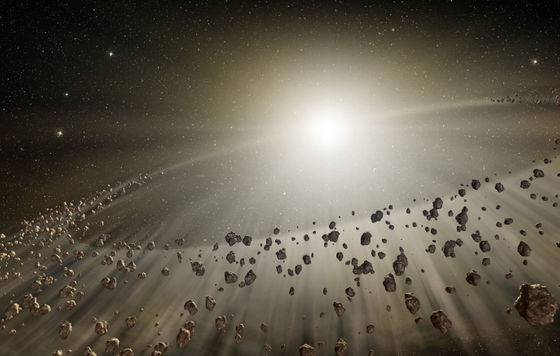Astronomers answer, 'Why is the night sky not filled with starlight?'

Looking up at the night sky, you can see stars twinkling in the darkness, but considering that there are countless bright stars and galaxies in the universe, the night sky is bright like daytime with the light of the stars. It doesn't seem strange. Live Science, a scientific news media, has compiled the answer to this question, 'Why does the universe look dark?'
Why does outer space look black? | Live Science
The question that 'the night sky should be covered with dazzling light' is known by astronomers and physicists as the 'Olbers' paradox.' According to Tenley Hutchinson-Smith, who studies astrophysics at the University of California, Santa Cruz (UCSC), this paradox can be explained by the expansion of the universe.
Hutchinson-Smith told Live Science, 'The universe we are in is expanding faster than light, so light from galaxies that are too far away is stretched in wavelength and in our eyes. May have changed to radio waves such as invisible infrared rays and microwaves, which means that the universe looks dark because the light of distant stars cannot be seen by the human eye. '

If Hutchinson-Smith's story is true, the universe is filled with invisible light, which is actually observed as
Regarding cosmic microwave background radiation, UCSC's Miranda Apfer said, 'Stars emit all kinds of light, including light that is invisible to humans, such as ultraviolet rays and infrared rays, so if humans are micro. If you can see the waves, the whole universe will look dazzling. '
Another reason the universe looks dark is that it has no material like the Earth's atmosphere. For example, the earth's sky looks blue because the molecules such as nitrogen and oxygen that make up the atmosphere scatter the blue and purple light contained in sunlight in all directions. This phenomenon is called Rayleigh scattering.

However, in a vacuum, light travels in a straight line from the source to the observer. Strictly speaking, it is not a vacuum because there are interstellar gas particles in outer space, but since there are few substances that scatter light, the phenomenon that brightens the Earth's sky does not occur and it is dark. You can see it.
Recent studies have also shown that the universe may not be as dark as scientists have previously thought. According to a paper published in April 2021 by the observation team of Todd Lauer and others at the National Optical Astronomy Observatory of the United States, the data observed by the space probe was removed from known stars and light from galaxies, and 'the background of the universe'. When I took a picture of 'light', it turned out to be twice as bright as expected. The reason why the universe was brighter than expected is unknown, and it is a subject for future research.
From this point, Live Science concludes the article, 'Maybe the universe is'dark gray'rather than'jet black'.'
Related Posts:
in Science, Posted by log1l_ks







